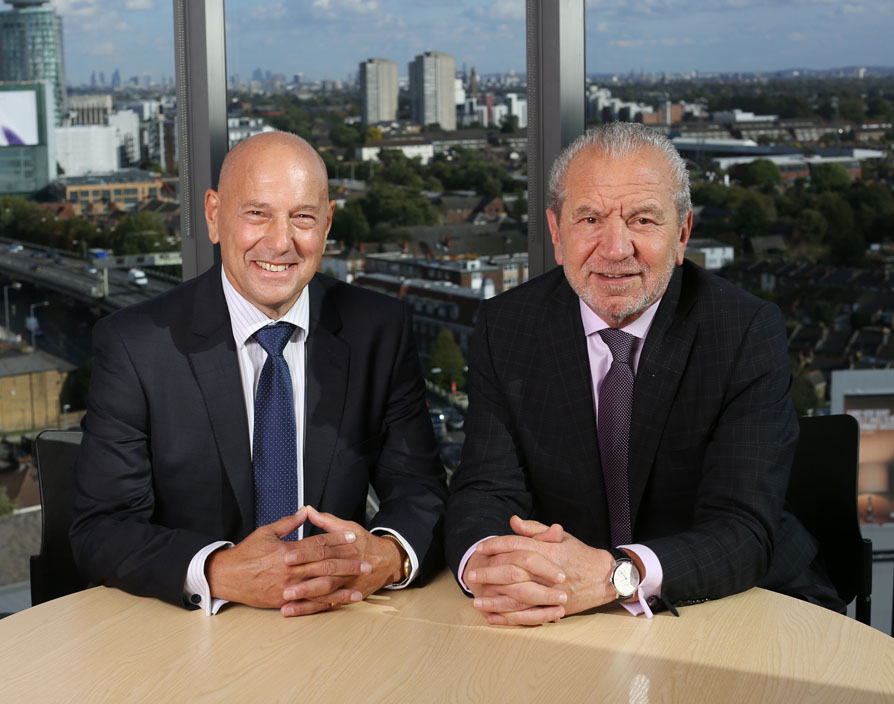Chest beating, female face-offs, humiliating boardroom exits: there’s no denying that The Apprentice is compelling TV. Yes, Alan Sugar is an admirable example of an old-school entrepreneur and of course the BBC1 series is more entertainment than business. Yet as a show that straddles both genres, The Apprentice could do more to highlight the qualities and skills people will need to navigate the workplace of the future. In my view, there are four areas where it falls short.
A reverence for rank
From Lord Sugar to the weekly appointment of leaders and sub-team leaders, The Apprentice just loves hierarchies. This leads to a culture where people are constantly being shut down or ignored by those in charge when they question strategy. In episode three’s robot task, Michaela used her status as team leader to unilaterally rename her team’s robot, sending the rest of her team into an embarrassing business pitch with a robot that – implausibly – had two names. Joanna was guilty of similar intransigence when she bulldozed through her excruciating ‘Expando’ brand in the car commercial episode.
A hierarchical approach is redundant in the future workplace, where the emphasis is on trust, transparency and empowering people. A recent Deloitte report on the future of work, revealed 40% of C-level execs expect to place more focus on providing greater autonomy at team and individual levels.
Looking ahead, future-facing companies are likely to swap hierarchies for playbooks: a blend of business process workflows, standard operating procedures and cultural values. Successful playbooks invert hierarchies by empowering people on the front line to make decisions because they are closest to the action.
The grim, gladiatorial culture
Much of the excitement around The Apprentice comes from the fact that it’s an elimination-based show. But the future of business is about teamwork and collaboration, supporting and empowering peers rather than the arse-covering and back-stabbing prevalent on most tasks and in the boardroom. One of the least edifying aspects of season 13 has been the female candidates arguing over everything from painting walls to making burgers. Bushra’s description of Elizabeth as “an uncontrollable, unprofessional, cartoon character” in episode five’s negotiation task is one such example.
Dog-eat-dog behaviour may exist within business but The Apprentice tends to present it as the norm. The moment a team learns it has lost a weekly task and is set to face the wrath of Lord Sugar in the boardroom, team-mates who have just spent two days working together suddenly turn on each other to make it to the next round. Lord Sugar’s description of Joanna as “argumentative and confrontational” in the car commercial episode could be applied to several of the remaining candidates.
This survival of the fittest culture is out of step with the way future-capable businesses are behaving. From the open-source movement to open banking, the emphasis is on empathy, partnerships and collaboration. Brands as diverse as Nike, Facebook and Tesla are sharing their software, enabling companies to launch using proven technology rather than having to reinvent the wheel. As Bob Mudge, president of consumer and mass business at Verizon, the telecoms giant, recently said: “Collaboration is no longer just a strategy: it is the key to long-term business competitiveness and success.”
Zero coaching and mentoring
The Apprentice is all about the candidates’ ability to “sink or swim”. Two competing teams perform tasks under the critical gaze of Lord Sugar’s advisors Karren Brady and Claude Littner – who possess a great range of disapproving facial expressions. Both are talented executives but, in this show, they take on the role of disappointed guardians, reduced to pantomime asides and petty interventions. A classic example in episode six saw Brady having a go at her team as they led a horse-and-trap tour through Bruges.
The role Brady and Littner play fuels the stereotype of senior executives as condescending and disapproving, rather than as coaches and mentors. Businesses increasingly need leaders who can coach and encourage their teams to experiment, fail and learn in order to come up with a ready supply of meaningful products and services that support the needs of the business and their customers.
Business nous trumps emotional intelligence
As a boy, Lord Sugar once made four shillings and sixpence by persuading a dressmaker to give him scraps of material and then selling them on to a rag-and-bone man. At times, the whole premise of the show appears to about finding someone with the same opportunism, salesmanship and drive as Lord Sugar.
Every organisation needs these qualities but The Apprentice often prioritises business nous over emotional intelligence (EI). Put simply, EI is all about how we make other people feel and listening to actually rather than just respond. It’s the ability to monitor our own and our colleagues’ feelings, discriminate between them and use this information to guide our thinking and behaviours. I can almost hear one of Lord Sugar’s withering put downs coming when I refer to EI. But according to TalentSmart, which provides emotional intelligence tools to more than 75% of the Fortune 500 companies: “We’ve found that 90% of top performers are also high in emotional intelligence. Our findings hold true in all industries, at all levels, in every region of the world.”
Ironically, EI is such a powerful indicator of performance that the show’s winners often do possess it – 2016’s winner Alana Spencer is an example. But the show does little to celebrate these qualities compared to the more conventional skills of pitching, selling and negotiating.
I’ll keep watching The Apprentice because it’s great water-cooler TV. But if the show aspires to be more than that, it needs to recognise and celebrate qualities and skills such as self-awareness, self-management and empathy that will equip businesses and people to succeed in the future. ![]()
Share via:








































